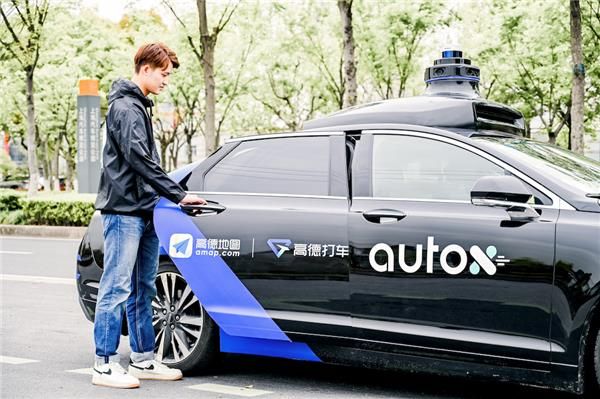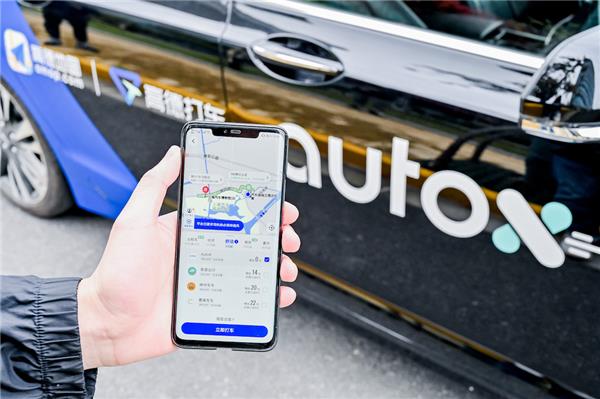Autonomous Driving Startup AutoX Announces the Public Launch of its Robo-taxi Service in China
【Summary】Self-driving technology developer AutoX, a company with a mission of “democratizing autonomy”, launched its robotaxi service in China on Monday in one of the first commercial launches of its kind.

Self-driving technology developer AutoX, a company with a mission of "democratizing autonomy", launched its robotaxi service in China on Monday, news outlet Gasgoo reported. The AutoX self-drving vehicles vehicles are picking up members of the public for the first time, becoming one of the first commercial launches of its kind.
The service has been in the works since last year. At the World Artificial Intelligence Conference (WAIC) in Aug 2019, AutoX signed a partnership with the City of Shanghai to jointly launch the first commercial robotaxi fleet in China.
The AutoX RoboTaxi service launched in Shanghai is the first time an autonomous ride-hailing service is available on a major ride-hailing platform in China, according to the company.
The AutoX service is simply called "Robotaxi."
Although the robotaxis were first deployed in April for testing purposes, they will now be picking up passengers.
Users are able to book a ride via AutoNavi, a popular mapping and transportation-booking app in China. AutoNavi was acquired by Chinese e-commerce giant Alibaba in 2014 for US$1.5 billion.
With the AutoNavi maps app, riders input the starting place and their destination. Once completed the system dispatches an AutoX vehicle from its nearby fleet. The vehicle will drive autonomously to the designated place to pick up the customer and take them to their desired destination.

For the pilot phase of the service, there will be a safety driver behind the wheel to oversee the operation and take over control of the vehicle if necessary.
During the trip, riders can monitor the journey from a display screen. The display shows passengers the driving route with turn by turn directions, so riders know exactly what the vehicle will do next. The display also shows all of the all of the objects that the vehicles identifies, including pedestrians, other vehicles and bicyclists.
AutoX was founded in 2016 in Silicon Valley by Xiao Jianxiong, a former Princeton University assistant professor. Xiao also serves as the company's CEO. He launched the company with a goal of "democratizing autonomy" by making it readily available as part of people's everyday lives. The company's U.S. headquarters are in San Jose, California.
"The seamless combination of autonomous and human-driving fleets is a crucial step for the adoption and commercialization of self-driving technology," Xiao said last year.
AutoX developed a full-stack Level 4 autonomous driving solution called the "AI Driver", which integrates both the software and hardware. The hardware includes solid-state lidar, high-definition cameras and a processor, which acts as the brain of the system. The full-stack AI Driver autonomous driving system can be installed on different types of vehicles.
In 2019, AutoX first announced a partnership with the City of Shanghai to launch 100 RoboTaxi vehicles in the largest RoboTaxi pilot in China. The company has also received autonomous driving permits in Shenzhen, Shanghai, and Guangzhou.
AutoX also entered a partnership agreement with Pengcheng Taxi, the largest taxi company in Shenzhen, to collaborate on the RoboTaxi deployment operation at scale.
In April, AutoX opened a RoboTaxi Operations Center in Shanghai to serve as a data hub for its self-driving fleet in Asia.
AutoX was the first autonomous driving developer in China to successfully navigate the downtown traffic in the mega-city of Shenzhen from any point to any point, the company said.
In the U.S., AutoX is one of three companies granted a permit from California's Department of Motor Vehicles (DMV) that allows it to test its driverless vehicles on public roads in the state without a driver in the vehicle.
The other two permit holders are Waymo, which spun out of Google's self-driving car project, and Nuro, a startup testing compact autonomous delivery vehicles for groceries and last mile delivery.
Current laws in California do not allow AutoX or any other companies to charge passengers for any types of experimental robotaxi services using autonomous vehicles as the state bans permit holders from collecting fares. However, AutoX, as well as Waymo, are pushing for California regulators to change the rule.
AutoX already holds a second permit to test its self-driving vehicles with a driver present behind the wheel, joining around 60 tech companies and automakers in California with the DMV permit, including Tesla, BMW, Ford, Nvidia, ride-sharing companies Uber and Lyft, as well as self-driving truck developer TuSimple.
In August 2018, AutoX announced it was launching an autonomous grocery delivery pilot in San Jose, CA. As part of the pilot service, users were able to order and receive fresh produce and other goods from grocery delivery company GrubMarket.com and have the order delivered by one of AutoX's self-driving vehicles. The pilot was available to customers in geo-fenced areas near the company's headquarters.
resource from: Gasgoo
-


Ford is Testing a New Robotic Charging Station to Assist Drivers of EVs With Disabilities
-


Ford Raises the Prices of the F-150 Lightning Electric Pickup Due to Rising Raw Material Costs
-


The BMW 7-Series to Feature HD Live Maps From HERE Technologies for Hands-Free Highway Driving in North America at Speeds up to 80 MPH
-


AutoX to Use the 'Eyeonic Vision Sensor' from California-based SiLC Technologies for its Robotaxi Fleet in China
-


LG Develops ‘Invisible’ Speaker Sound Technology That Could Revolutionize In-Vehicle Audio
-


Researchers at South Korea’s Chung-Ang University Develop a ‘Meta-Reinforcement’ Machine Learning Algorithm for Traffic Lights to Improve Vehicle Throughput
-


Zeekr’s New 009 Electric Passenger Van is the World’s First EV to Feature CATL’s Advanced ‘Qilin’ Battery With a Range of 510 Miles
-


Redwood Materials is Building an Electric Vehicle Battery Recycling Facility in South Carolina
- Tesla Rival NIO Reports a Record 31,607 Electric Vehicles Deliveries in Q3 as Demand Grows
- Volkswagen Group of America President and CEO is Appointed to Lead the Automaker's New Electric Off-Road Truck Division ‘Scout’
- Ford Looks to Have 100% of EV Sales Be Online
- Rivian is Laying Off 6% of its Workforce, Citing Erratic Economy
- Consumer Reports Survey Finds Roughly 28% of Respondents Don't Want to Buy an EV
- Toyota to Collaborate With Texas-based Utility Provider Oncor to Accelerate a Vehicle-to-Grid EV Charging Ecosystem
- Mercedes-Benz is Partnering with Game Engine Developer Unity Technologies to Create Immersive, 3D Infotainment Screens and Displays for its Future Vehicles
- Ford CFO Claims Inflation Has Erased Mustang Mach-E Profits
- China Added 963,000 Electric Vehicle Charging Piles Since January in its Push to Lead the World in EV Sales
- US-listed LiDAR Developers Velodyne and Ouster to Merge in an All-Stock Deal











 About Us
About Us Contact Us
Contact Us Careers
Careers